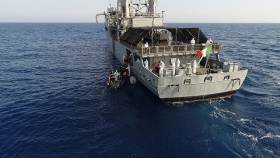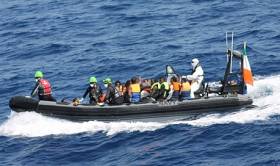Displaying items by tag: Operation Pontus
Rescue of 346 Migrants by LÉ Eithne off Libya
#RefugeeRescue- Following a request from the Italian Maritime Rescue Co-Ordination Centre, LÉ Eithne yesterday located and rescued a total of 135 migrants off Libya.
The migrants were found on an inflatable craft approx 83Km off the north-west coast of Tripoli.
The LÉ Eithne was subsequently appointed on scene coordinator by the Italian Maritime Rescue Co-Ordination to coordinate the rescue efforts of 3 NGO vessels dealing with 10 platforms in distress (PIDs).
The Naval Service flagship has now completed a second and third rescue of 211 migrants from two further inflatable craft, as well as taking 85 migrants on board from one of the NGO ships.
On board are 431 migrants (346 rescued, 85 transferred from NGO vessel) and is proceeding to two further PIDs, while also coordinating the NGO ships.
The migrants on board received food water and medical treatment where required.
European Award to Defence Forces For Humanitarian Work
#EuropeAward - The Irish Defences Forces were presented The European of the Year award writes The Irish Times.
The award was given by the European Movement Ireland in recognition of the Defence Forces’ contribution to international peacekeeping and humanitarian work.
The award was presented at a ceremony on Monday in Dublin’s Shelbourne Hotel by Taoiseach Enda Kenny, who is honorary president of the Movement.
“The Defence Forces have a proud history of international service for Ireland and on behalf of the European Union and the United Nations, ” he said. “They are a very worthy recipient, especially this year, when, as well as their ongoing humanitarian and peace-keeping endeavours abroad, they have played a very prominent and important role in our 1916 Centenary commemorations.”
Approximately 385 Defence Forces personnel are serving overseas at present.
For the past two years, the Naval Service has been involved in Operation Pontus, supporting the Italian Marine Rescue Co-Ordination Centre which has been overseeing a multi-lateral effort at rescuing migrants crossing the Mediterranean Sea from north Africa.
Since May 2015, Defence Forces ships rescued over 15,000 would-be migrants attempting to cross the sea. The newapaper has more here.
Afloat adds that the awards ceremony took place also with yesterday's RTE One broadcast of 'The Crossing'
With unprecedented access, The Crossing tells story of one month in the LÉ Samuel Beckett’s deployment in the southern Mediterranean. It shows the reality for both the crew and the migrants as their worlds meet in the middle of the sea, often in the most difficult of circumstances. To view click this link to the RTE iplayer here.
Following the harrowing reality of The Crossing which examined the humanitarian mission of 'Operation Pontus' RTE also had a follow-up Claire Byrne Live Extras: Defence Forces in the Mediterranean. Minister of State at the Department of Defence, Paul Kehoe, actor Liam Cunningham who is a charity ambassador for World Vision and columnist Ian O’Doherty discuss the Irish response to the migrant crisis. Are we suitably equipped to take in large numbers of refugees and how do we treat migrants who have already arrived here?
To also view this current affairs programme click here.
LÉ Samuel Beckett which was deployed in September is to end its search and rescue missions and is due to return to Irish waters this Friday.






























































